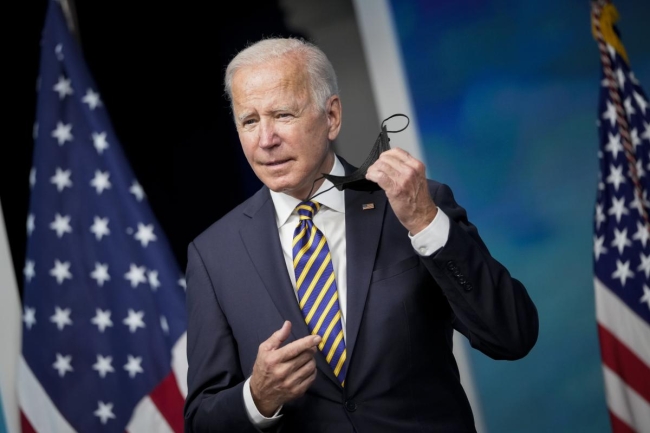You have /5 articles left.
Sign up for a free account or log in.

President Joe Biden
Drew Angerer/Getty Images North America/Getty Images
The Biden administration on Thursday unveiled the details of a new rule requiring employers with 100 or more employees to mandate employees either be vaccinated against COVID-19 or undergo weekly testing.
The Occupational Safety and Health Administration rule requires employees be fully vaccinated by Jan. 4 in order to avoid COVID-19 testing requirements. It also requires employers to ensure that unvaccinated employees wear face masks in the workplace.
The OSHA rule promises to further expand the number of colleges subject to a federal vaccine mandate -- albeit a soft mandate in this case, with a testing alternative. Steven Bloom, assistant vice president for government relations at the American Council on Education, said the OSHA rule would apply to all private colleges with 100 or more employees as well as to public colleges in the 26 states and two territories where government workers are under OSHA’s jurisdiction.
Already, many major research universities have announced new vaccination requirements for employees -- including student employees -- in order to comply with a separate executive order mandating vaccination for federal contractors (many universities have many millions of dollars in federal contracts). The Biden administration also announced Thursday it was pushing the date for federal contractors to come into compliance with the vaccination requirement back from Dec. 8 to Jan. 4, to create a uniform deadline.
“For our country, the choice is simple: get more people vaccinated, or prolong this pandemic and its impact on our country,” President Joe Biden said in a statement Thursday. “The virus will not go away by itself, or because we wish it away: we have to act. Vaccination is the single best pathway out of this pandemic. And while I would have much preferred that requirements not become necessary, too many people remain unvaccinated for us to get out of this pandemic for good.”
The OSHA rule requires employers to provide paid time off for employees to be vaccinated, up to four hours off per vaccine dose, and to provide “reasonable time and paid sick leave” for employees experiencing vaccine side effects.
The rule does not require employers to pay for the costs of weekly testing and face coverings for employees who choose to be tested rather than vaccinated.
The OSHA rule does not apply to employers that are already subject to the federal contractor vaccination mandate, as OSHA has determined that those employees are already adequately protected under stricter guidelines developed by the Safer Federal Workforce Task Force. The guidelines for federal contractors do not allow employees to choose to undergo regular testing in lieu of vaccination, although they do allow medical and religious accommodations.
While many Republican-led states have laws or executive orders in place prohibiting COVID-19 vaccination mandates or mask requirements, OSHA says the rule is intended to “preempt and invalidate any State or local requirements that ban or limit an employer’s authority to require vaccination, face covering, or testing. State and local requirements that prohibit employers from implementing employee vaccination mandates, or from requiring face coverings in workplaces, serve as a barrier to OSHA’s implementation of this [emergency temporary standard], and to the protection of America’s workforce from COVID-19.”
Legal challenges to the OSHA rule are expected.
Some 19 Republican-led states have filed at least four separate lawsuits challenging Biden’s separate vaccination mandate for federal contractors. Florida and Texas have each sued over the federal contractor mandate, and there are also two separate multistate lawsuits, one led by Georgia and another led by Missouri and Nebraska.
In addition to rolling out the OSHA rule Thursday, the Biden administration also released a new rule requiring vaccination against COVID-19 for all workers at health-care facilities that participate in Medicaid or Medicare. The rule applies to clinical and nonclinical employees as well as to students, trainees and volunteers.
More than 1,100 colleges and universities are requiring vaccination against COVID-19 for at least some employees or students, according to a tracker maintained by The Chronicle of Higher Education.
Hundreds of colleges announced vaccination requirements of their own accord before the announcement of federal requirements, and dozens more institutions have announced requirements for employees, including student employees, in recent weeks in response to the federal contractor mandate. However, some major research universities with federal contracts have held off on announcing new employee vaccination requirements, saying they are continuing to study the order and their options.
“For a lot of places, it’s in the rearview mirror -- they’ve already gone down a path that would be in compliance with this, so they won’t see a lot of change,” said Peter Lake, the Charles A. Dana Chair and director of the Center for Excellence in Higher Education Law and Policy at Stetson University in Florida. “But I think that for some places, the battle is going to be on. I expect the court system to come in and referee some of the issues that are going to come up with state laws and state policies that are contradictory to the federal approach.”
Joshua M. Sharfstein, vice dean for public health practice and community engagement at Johns Hopkins University, said there are pros and cons of federal vaccination mandates.
“The upside is many more people are getting vaccinated than otherwise would -- there’s just no question that a mandate moves a lot of people to be vaccinated,” he said. “The downside is there are people who are very offended by the concept of a mandate, and in the context of so much misinformation about vaccines, it can fuel polarization. I think the best way to address this is to take a step back from the politics and for universities and colleges to pick a good policy based on the merits of keeping their community and their surrounding community safe, and not just because they were forced to.”




